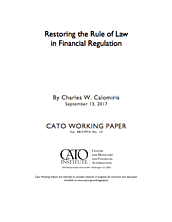Restoring the Rule of Law in Financial Regulation
Increasingly, financial regulation has adopted processes that are inconsistent with adherence to the rule of law. Appropriate regulatory process is fundamental to the ability of regulation to succeed because process defines the incentives of regulators, which are crucial to ensure that regulators act diligently in pursuit of bona fide objectives. Relying on flawed regulatory processes – especially those related to the use of “guidance,” which avoids transparency, accountability and predictability, and thereby increases regulatory risk – has resulted in poor execution of regulatory responsibilities, unnecessary regulatory costs and opportunities for politicized mischief. This article analyzes four examples of flawed process from recent regulatory constructs – the CFPB, the FSOC, Operation Choke Point, and stress testing – and offers potential solutions. In addition to solutions that address problems specific to each of the four examples, more broadly, regulatory practice should be grounded in formal rule making rather than the reliance on guidance.

